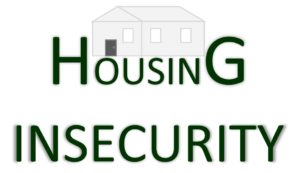Housing Insecurity (also commonly referred to as “homelessness”) will be defined on Woodland Community College campus as any individual who:
(a) Lacks a fixed, regular, and adequate residence within the past 30 days. This includes:
(i) Sharing the housing of other persons due to loss of housing, economic hardship, or a similar reason
(ii) Living in a motel, hotel, campground, a car, park, abandoned building, bus or train station, airport or any shelter without a fixed foundation (e.g. travel trailer, etc.) due to a natural disaster, lack of financial stability and longevity, or lack of alternative adequate accommodations
(iii) Living in an emergency or transitional shelter
(iv) Abandoned in a hospital
(v) Awaiting foster care placement
(vi) Living in a place not meant for permanent human habitation
(vii) Living in an apartment without a legal claim to residency (e.g. not signor on written lease resulting in no guarantee of tenant’s rights.)
(b) Is a family or unaccompanied* youth (means you are 21 years or younger or you are still enrolled in high school as of the day you sign the application) who have not had a lease or ownership interest in a housing unit in the last 60 or more days, have had two or more moves in the last 60 days, and who are likely to continue to be unstably housed. Unaccompanied means you are not living in the physical custody of your parent or guardian.
(c) Is under 18 years of age and absents himself or herself from home or place of legal residence without the permission of his or her family (i.e., runaway youth).
(d) Is losing their primary residence within 14 days and lacks resources or support networks to remain in housing or has been given an eviction notice.
(e) People who are fleeing or attempting to flee domestic violence, dating violence, sexual assault, stalking, or other dangerous or life-threatening situations related to violence, have no other residence, and lack the resources or support networks to obtain other permanent housing.
This definition does not include an individual imprisoned or detained under an Act of Congress or State law. An individual who may be sleeping in a temporary accommodation while away from primary residence should not, as a result of that alone, be recorded as housing insecure.
Transportation insecurity:
“Transportation insecurity is defined by a set of broad transportation issues including unreliable to public or private transportation, accessible methods of transportation being unaffordable or unsafe, having an extended commute, and transportation access being limited by weather or personal health.”
